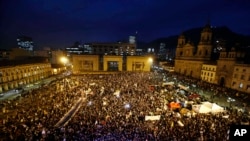Thousands of Colombians wearing white and carrying flowers marched through Bogota on Wednesday demanding that politicians revive a peace accord to end five decades of war after voters rejected the hard-fought deal in a referendum.
In a show of support for the agreement inked last month by President Juan Manuel Santos and Rodrigo Londono, head of the Revolutionary Armed Forces of Colombia (FARC), the throng of students, farmers and indigenous leaders congregated in Plaza Bolivar, in front of Congress.
"All Colombians must work on building peace. We must strive for a better future and forgiveness is the best example we can give," said Carmenza Pinto, 64, who was displaced by the war, as she joined the so-called "March of the Flowers."
The demonstration took place as Santos and his team heard proposals from representatives of those who voted against the accord - rejected by a razor-thin margin of less than half a percentage point - as too lenient on the Marxist rebels.
Londono, known by his nom de guerre, Timochenko, said early on Wednesday he has met on numerous occasions with government negotiators in Havana to find a way around the impasse and is confident the deal can be resuscitated.
"This is a conflict that has gone on many years and opened deep wounds... We must join forces and together apply healing balm to the wounds," Londono, 57, told Caracol Radio. "We will have good news soon."
Led by hardline former President Alvaro Uribe, the "No" side wants FARC leaders to lose their freedom for five to eight years and be banned from elected office.
They were outraged that the accord offered ten congressional seats instead of prison cells in return for ending a conflict that has killed more than 220,000 people.
Uribe opposed FARC leaders receiving non-traditional sentences like clearing landmines, and instead insisted they be confined, even if they are held on farms.
Although the FARC leadership has said it is willing to hear new ideas, Uribe's proposals may be difficult to accept, given they have repeatedly refused to consider jail time and want to form a political party.
Londono said he respects the views of the “No" camp, and even Uribe, whose two terms in office were spent in a fierce offensive against the FARC.
But he reiterated FARC's opposition to renegotiating the justice element of the accord.





